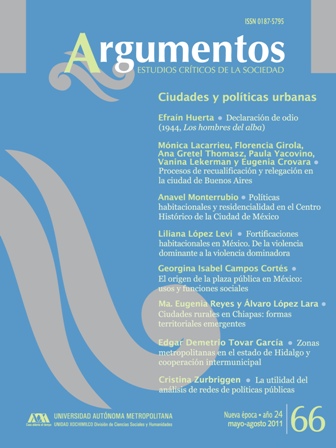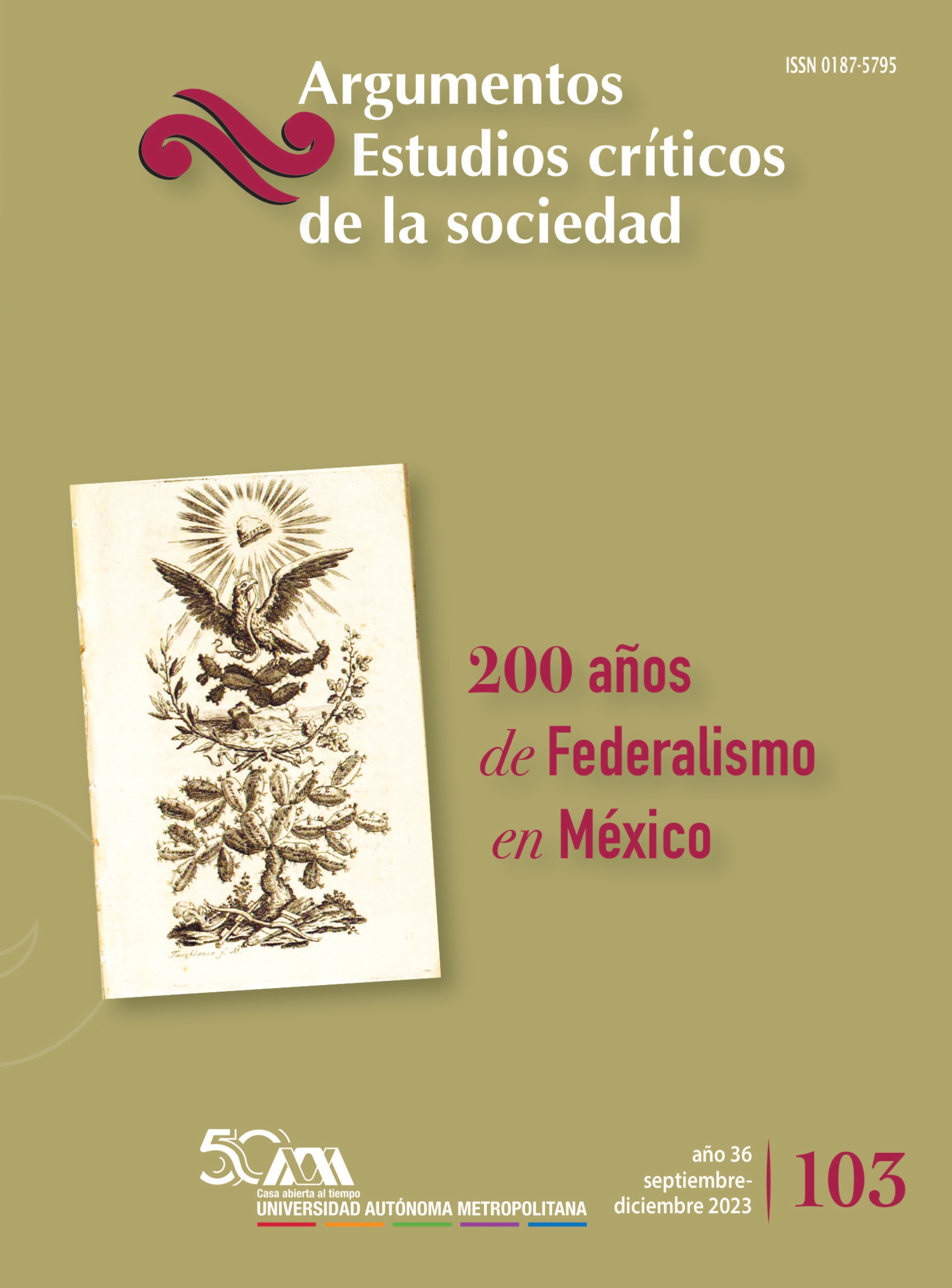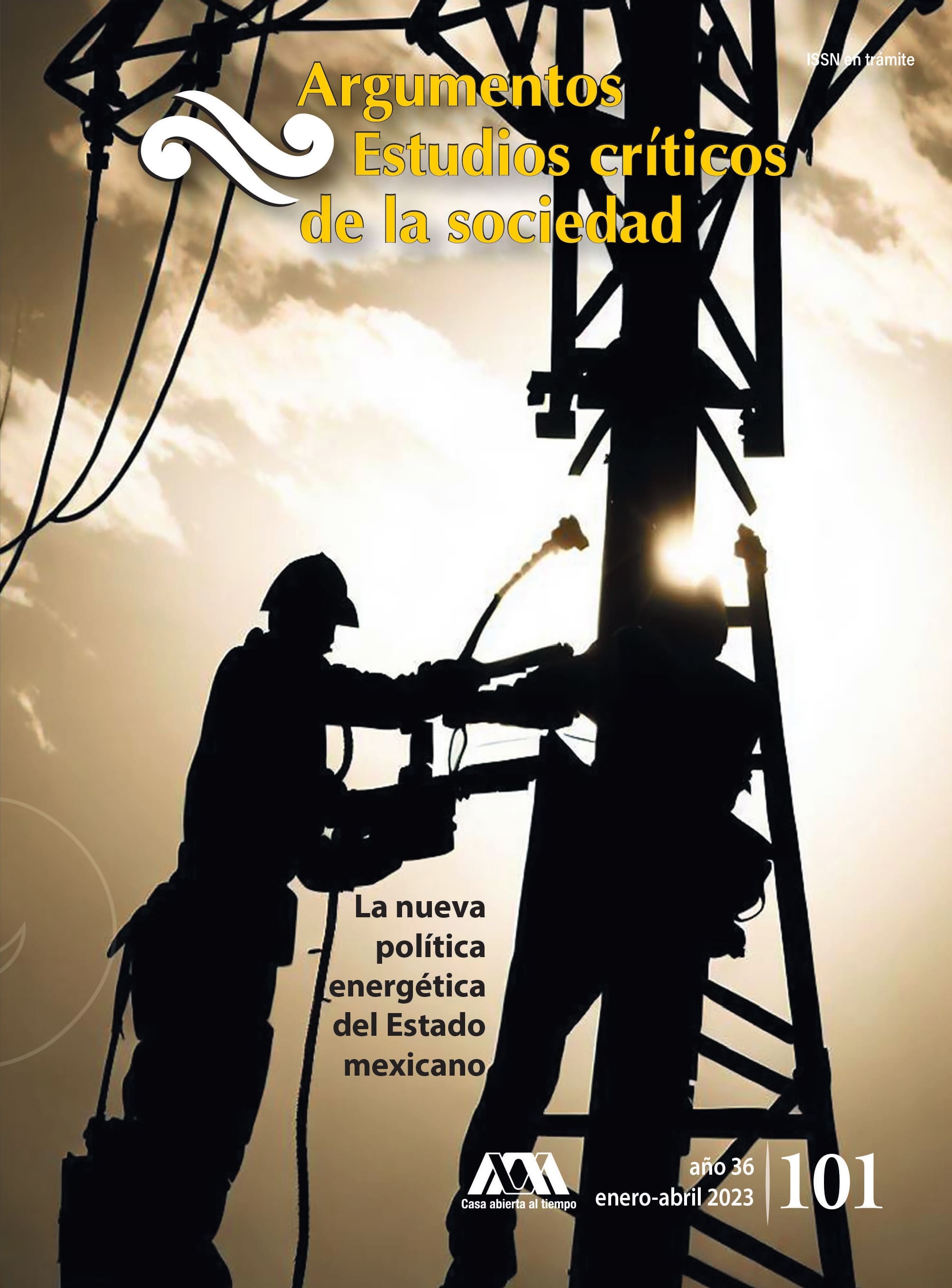La utilidad del análisis de redes de políticas públicas
Palabras clave:
redes de políticas públicas, gobernanza, políticas pública, institucionalismo centrado en los actoresResumen
El concepto de redes de políticas públicas y gobernanza adquiere cada vez más relevancia en los debates teóricos y en la práctica política, en tanto nuevo modo de entender las relaciones entre Estado, sociedad y mercado. Sin embargo, el aumento de la participación de actores privados y sociales en la gestión pública está implicando cambios sustanciales en la forma de comprender la naturaleza y el ejercicio del poder. En este sentido, se analiza cómo el enfoque de redes no sólo se presenta como un marco conceptual que describe la complejidad de los vínculos entre los actores en una arena política, sino que también se ha desarrollado como una herramienta analítica útil para el estudio de las hechuras de las políticas y con poder teórico.
Citas
Atkinson, Michael, William D., “Strong States and Weak States: Sectoral Policy Networks in Advanced Capitalist Economies”, British Journal of Political Science, vol. 14, núm. 1, 1989, pp. 46-67.
Auyero Javier, ¿Favores por votos?, Losada, Buenos Aires, 1997.
Dahl, Robert, A Preface to Democratic Theory, University of Chicago Press, Chicago, 1956.
Daugbjerg, Carsten, David Marsh, “Explaining policy outcomes”, en David Marsh (ed.), Comparing Policy Networks, Open University Press, Buckingham, 1998.
Dolowitz, D., D. Marsh, “Learning from Abroad: The Role of Policy Transfer in Contemporany Policy-Making”, Governance, vol. 13, núm. 1, enero, 2000.
Delenbos, J., E.H. Klijn, “Managing Stakeholder Involvement in Decision making: a Comparative Analysis of Six Interactive Processes in The Netherlands”, Journal of Public Administration Research and Theory, 16, 3, 2006, pp. 417-446.
Fischer, F., “Beyond Empiricism: Policy Analysis as deliberative Practice”, M.A. Hajer, H. Wagenaar, Deliberative Policy Analysis, CUP, Cambridge, 2003.
Freeman, J.L., The political process: Executive Bureau-Legislative Committee Relations, Random House, Nueva York, 1965.
Giddens, A., Bases para la teoría de la estructuración, Amorrortu, Buenos Aires, 1995.
Hanneman, Robert, Introducción a los métodos de análisis de redes sociales, Departamento de Sociología de la Universidad de California, California, 2005 [http://faculty.ucr.edu/~hanneman/].
Hay, Colin, “The tangled webs we weave: the discourse, strategy and practice of networking”, Marsh, David (ed.) Comparing Policy Networks, Open University Press, Buckingham, 1998.
Heclo, H, “Issue Networks and the Executive Establishment”, Anthony King (ed.), The New American Political System, American Enterprise Institute, Washington D.C., 1978.
Heinz, John; Laumann Edgard, Nelson Robert y Robert Salisbury, The Hollow Core: Private Interests in National Policy Making, Harvard University Press, Cambridge, Mass., 1993.
Heritier, A., Policy-Making and Diversity in Europe: Escape from Deadlock, Cambridge University Press, Cambridge y Nueva York, 1999.
Hirst, Paul, Associative Democracy. New Forms of Economic and Social Governance, Polity Press, Cambridge, 1994.
Hudson J., Stuart Lowe, Natalie Oscroft, Carolyn Snell, “Activating Policy Networks. A case study of local environmental policy-making in the United Kingdom Policy”, Policy Studies, vol. 28, núm. 1, 2007.
Jessop, B., “The Rise of governance and the Risks of Failure: the Case of Economic Development”, en International Social Science Journal, 1998, pp. 29-45.
John, P., A. Cole, “When do institutions, policy sectors and cities matter? Comparing networks of local policy making in Britain and France”, Comparative Political Studies, núm. 33, 2000, pp. 248-268.
Jordan, A.G., K. Schubert, “A preliminary ordering of policy network labels”, European Journal of Political Research, núm. 21, 1992, pp. 7-27.
Jordana, Jacint, “El analisis de los policy networks: ¿una nueva perspectiva sobre la relación entre políticas públicas y Estado”, Gestion y análisis de políticas públicas, núm. 3, Madrid, 1995.
Kenis, P., V. Schneider, “Policy networks and policy analysis: scrutinizing the a new analytical toolbox”, B. Marin, R. Mayntz (eds.), Policy Networks: Empirical Evidence and Theoretical Considerations, Campus, Frankfurt, 1991.
Kickert, W.J.M.; E.H. Klijn, J.F.M. Koppenjan (eds.), Managing Complex Networks, Sage, Londress, 1997.Kickert W.J.M., “Beneath consensual corporatism: traditions of gobernanza in the Netherlands”, en Public Administration, vol. 81, núm. 1, 2003, pp. 119-140.
Klijn, E.H., Chris Skelcher, “Democracy and governance networks: compatible or not?”, Public Administration, vol. 85, núm. 3, 2007, pp.587-608.
Knoke, David y Kelly Chermark, “All Bonds Do Tie Me Day by Day: Confirmed Ties and Social Network Status”, paper presentado en 21st European Group on Organization Studies Colloquium, Sub-theme 38: Social, Cognitive and Strategic Processes in Networks, Standing Working Group: Business Networks. Berlín, 30 de junio-2 de julio de 2005
Kooiman, J., Modern Gobernanza, Sage Publications, Londres, 1993.
Koppenjan, J.F.M., en E.H. Klijn, Managing Uncertainties in Networks, Routledge, Londres, 2004.
Laumann, Edward y Alfred Knoke, The Organizational State. Social Choice in National Policy Domains, The University of Wisconsin Press, Madison, 1997.
Lasswell, H., The Decisión Process: Seven Categories of Functional Analysis, University of Maryland Press, College Park, 1956.
Lehmbruch, G., “Liberal Corporatism and party government”, Comparative Political Studies, vol. 10, núm. 1, 1997, pp. 91-126.
Lowi, Theodore J., “Four Systems of Policy, Politics, and Choice”, Public Administration Review, núm. 33, 1968, pp. 298-310.
Marin, Bernd, Renate Mayntz (eds.), Policy networks: empirical evidence and theoretical considerations, Boulder Campus Verlag; Westview Press, Frankfurt, 1991.
Marsh, David, Comparing Policy Networks, Open University Press, Buckingham, 1998.
——, “Understanding British Government: Analyzing Competing Models”, Journal of Politics and International Relations, vol. 10, núm. 1, 2008, pp. 251-268.
——, M. Smith, “Understanding policy networks: Towards a dialectical approach”, Political Studies, 48, 1, 2000, pp. 4-21.
Marsh, D., R.A.W. Rhodes, Policy Networks in British Government, Clarendon Press, Oxford, 1992.
Marsh, D., R. Richards, M. Smith, Changing Patterns of Governance in the UK: Reinventing Whitehall, Macmillan, Basingstoke, 2002.
Marsh, D., D. Toke, “Policy networks and the GM crops issue: Assessing the utility of the dialectical model of policy networks”, Public Administration, 81, 2, 2003, pp. 229-251.
Mathur, N., C. Skelcher, “Evaluating Democratic Performance: Methodologies for Assessing the Relationship between Network Governance and Citizens”, Public Administration Review, 67, 2, 2007, pp. 228-237.
Mayntz, Renate, “Policy-Netzwerke und die Logik von Verhandlungssystemen”, Adrienne Héritier (ed.), Policy Analyse. Kritik und Neuorientierung, PVS, Sonderheft 24, Westdeutscher Verlag, Opladen, 1993.
Mayntz, Renate, “Modernization and the Logic of Interorganizational Networks”, MIPGFWorking Paper n. 4, Max-Planck-Institut für Gesellschaftsforschung, Colonia, 1994.
Marin Alexandra y Barry Wellman, Social Network Analysis: An Introduction1, Department of Sociology, University of Toronto June 11, 2009 Forthcoming in Handbook of Social Network Analysis, edited by Peter Carrington and John Scott, Sage, Londres, 2010.
Meuleman, L., “The Cultural Dimension of Metagovernance: Why Governance Doctrines May Fail”, Public Organization Review, DOI 10.1007/s11115-009-0088-5, 2009.
O’Donnell Guillermo, Contrapuntos. Ensayos escogidos sobre autoritarismo y democratización, Paidós, Buenos Aires, 1997.
Peters, Guy, “Gobernanza, Meta-gobernanza y Cambio de Política” en Cristina Zurbriggen y Freddy Mariñez Navarro (coords.), Gestión de Redes institucionales, ¿un nuevo modelo de gestión?, Porrúa, México (en prensa)
Peters, Guy, “Policy networks: myth, metaphor and reality”, David Marsh, Comparing Policy Networks, Open University Press, Buckkingham, 1998. Pierre, Jon, Guy Peters, Governance, Politics and the State, St. Martin’s Press, Londres, 2000.
Rhodes, R.A.W., Beyond Westminster and Whitehall: the Sub-central governments of Britain, Unwin Hyman, Londres, 1998.
——, “The Hollowing out of the State: The changing nature of the public service in Britain”, The Political Quarterly, 65, 2, pp. 138-151, 1994.
——, Understanding Governance: Policy Networks, Governance, Reflexivity and Accountability, Open University Press, Londres, 1997.
——, “Governance and Public Administration”, Jon Pierre (coord.), Debating Governance: Authority, Steering, and Democracy, Oxford University Press, Oxford, 2000.
——, Understanding Governance: ten years on. School of Social Sciences, Australian National University, Canberra, Australia, 2007.
Richards, David, Martin Smith, Governance and Public Policy in the UK, Oxford University Press, Londres, 2002.
Richardson, J.J., A.G. Jordan, Governing under Pressure, Martin Robertson, Oxford, 1979.
Ripley, R.B., G.A. Franklin, Congress, the bureaucracy and public policy, Brooks/Cole, Pacific Grove, 1987.
Rokkan, S., Citizens Elections Parties. Approaches to the Comparative Study of the Processes of Development, Universitetsforlaget, Oslo, 1970.
Scharpf, Fritz W., “Positive und negative Koordination”, Adrienne Héritier (ed.), Policy-Analyse. Kritik und Neuorientierung, PVS, Sonderheft 24, Westdeutscher Verlag, Opladen, 1993.
Scharpf, Fritz W., Games Real Actors Play: Actor-Centred Institutionalism in Policy Research, Westview Press, Boulder, 1997.
Schmitter, Philippe C., “Still the Century of Corporatism?”, Review of Politics, 36, 1974, pp. 85-131.
Smith, Martin, Pressure Power & Policy, University of Pittsburgh Press, Pittsburgh, 1993.
Sorensen, E., J. Torfing, J., The European Gobernanza Debate, paper presentado en el 21st IPSAWorld Congress of Political Science, 2009.
Stoker, Gerry, “Governance as Theory: Five Propositions”, International Social Science Journal, vol. 50, núm. 155, 1998, pp. 17-28.
Toke,Dave, “A Comparative Study of the Politics of GM Foods and Crops”, Political Studies, 52 (1), 2004, pp. 179-186.
Toke, Dave, “Wind power in the UK: how planning conditions and financial arrangements affect outcomes”, International Journal of Sustainable Energy, 23, 4, 2003, pp. 207-216.
Toke, Dave, Claire Haggett, “Crossing the great divide-Using multi-methodanalysis to understand opposition to windfarms”, Public Administration, 84, 1, 2006, pp. 103-120.
Torfing, J. ,“Governance Network Theory: Towards a Second Generation”, European Political Studies, 4, 2005, pp. 305-315.
Wasserman Stanley y Katherine Faust, “Canonical Analysis of the Composition and Structure of Social Networks”, Sociological Methodology, vol. 19, 1989, pp. 1-42.
Wellman, Barry, Network Analysis: Some Basic Principles Sociological Theory, vol. 1, 1983, pp. 155-200.
Talbot, C., C. Pollitt et al, The idea of agency. Reseaching the agencification of the (public service) world, Paper for the American Political Studies Association Conference, Washington D.C., 2000.
Thompson, M., Ellis, R.., Wildavsky, A., Cultural theory, Westview, Boulder, 1990.
Zurbriggen, Cristina, Las redes de políticas públicas. Una revisión teórica, en colección Documentos Sistema Político y Gobernabilidad Democrática, Instituto Internacional de Gobernabilidad, Barcelona, 2003
.——, Estado, empresarios y redes rentistas durante el proceso sustitutivo de importaciones en Uruguay. El path dependence de las reformas actuales, Eberhard-Karls-Universität Tübingen, Alemania, 2005.








